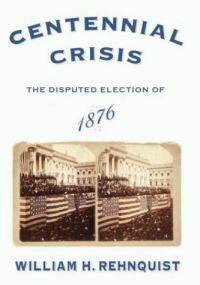

Purchase
Centennial Crisis: Disputed Election of 1876
William H. Rehnquist
Alfred A. Knopf
March 2004
288 pages
ISBN: 0375413871
Hardcover
Add to Wish List
Non-Fiction
Near midnight on Election Day in November 1876, the returns
coming into Republican National headquarters signaled a
victory for the Democratic presidential candidate, Samuel
J. Tilden. But alert Republican leaders saw that if all the
states still doubtful or disputed went for their candidate,
Rutherford B. Hayes would be elected. Word was sent out to
four southern states that their returns were crucial for a
Hayes victory. Thus Chief Justice William Rehnquist begins
this remarkable account of one of American's greatest
political dramas, a crisis that was not resolved for nearly
four months, on March 2, 1877, only two days before
Inauguration Day.
In his gripping story, Rehnquist tells how each party
maneuvered to buy votes in the southern states, how the
country slid into Congressional, judicial and public
turmoil, and how the creation in January of an Electoral
Commission (comprised of five Democrats, five Republicans
and five Supreme Court justices) was opposed by both
candidates. When that body's deciding vote was cast by
Justice Joseph Bradley, public outcry reached such a fever
pitch that the presidential swearing-in had to be held on a
Sunday in near secrecry. Reaching beyond the history of a contentious election, the
Chief Justice describes the political climate and economy
of America in the 1870's, packing his narrative with
biographical sketches of the central participants and
opening a window on events in that decade that have long
been overlooked. In a compelling epilogue we learn the
occasions when Presidents, ranging from George Washington
to Lyndon Johnson, have asked Supreme Court justices to
arbitrate disputes, settle treaties or serve on
investigating commissions. Almost always the justices were
berated and attacked for their decisions. Would it be better for them to have refused the president's
request? The Chief Justice has some surprising answers.
Comments
No comments posted.
Registered users may leave comments.
Log in or register now!
| 


 © 2003-2024 off-the-edge.net
all rights reserved Privacy Policy
© 2003-2024 off-the-edge.net
all rights reserved Privacy Policy